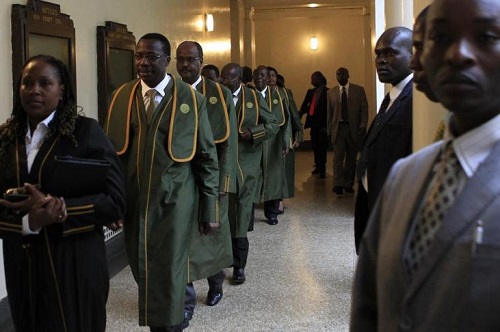Reuters photo
By
Raymond Asante
It is a little past 11.00 am and the courtroom is silent. The accused, the defense attorney, the state prosecutor and even the judge who is supposed to be trying the case of the State are absent. In fact almost all the courts turn out to be empty. A clue to the mystery may lie in the smell of fried chicken wafting along the airy corridors of most high courts in my country Ghana which manages to get through less than half of the cases put before it each year, leading to an ever increasing backlog.
The wheels of Justice may turn slowly in Zimbabwe but in some other parts of the continent they have almost fallen off. In the Central Africa Republic (CAR) for instance, UN peacekeepers lament their inability to arrest criminals in the town of Kaga Bandoro because there are no holding cells to hold them, never mind a courtroom or judges to give them a fair trial.
Zimbabwe and CAR are extreme examples, but across much of Africa you will find courtrooms that are dilapidated and judges who take an age to resolve disputes or sort the innocent from the guilty. Among the myriad problems Africa faces it may seem odd to prioritize the provision of justice. But until legal systems become faster and fairer, the continent will struggle to attract foreign investment.
Locals share these concerns. A business man in Nigeria sighs that he feels like a character in a “Bleak Horse”. He has two lawsuits against another Nigerian business man that have been before the courts for more than a decade. Every time that one comes up for hearing, they get another postponement. Even worse than the slow judges are the dodgy ones.
In Ghana the judiciary was scandalized in 2015 when an undercover journalist aired footage and audio recordings of judges taking bribes or demanding sex to sway their rulings. As many as 34 were implicated, many of whom have since been fired or retired. Nigeria too have recently suspended judges as part of its crackdown of corruption, but the problem spreads far beyond West Africa.
To be fair, being a judge can be risky. In Ghana several judges or their wives and children have been kidnapped in recent years, although it is not clear whether these were simply for ransom or to change their minds on the point of law, lawyers having also been killed in Nigeria and Kenya.
South Africa’s constitutional courts have been a beacon of independence in standing up to the Government. H.E Jacob Zuma, the president, is facing over 783 charges of corruption. He fired or forced senior policemen and prosecutors to resign and replaced them with deeply compromised people. Several of these appointments have since been overturned by the courts of South Africa.
Courts that work and honest independent judges are but two elements of the complexity of rules, institutions and traditions that make up the rule of law. Among the other essential elements are governments that try to act within the law and, when they fail to do so, obey the courts.
Yet things may be improving. Many African countries are buffing up their laws and courts to woo foreign investors. And the prosecution of some crimes is being internationalized. This happens not just through organizations like the International Criminal Court which deals with serious violation of Human Rights but also through the judiciary of some rich countries. Anti-bribery laws in America and Britain, for example, not only focus the minds of British and American business men who risk arrest if they pay bribes in Africa, but also Africans who worry they may be arrested for bribery at home if they travel abroad. This means that even in places where the courts are weak, people can be forced to play by the rules.
Raymond Asante
Raymond Asante is a political Advocate. He is known for his pragmatic, result oriented and visionary roles.



No Comments Yet!
You can be first to comment this post!